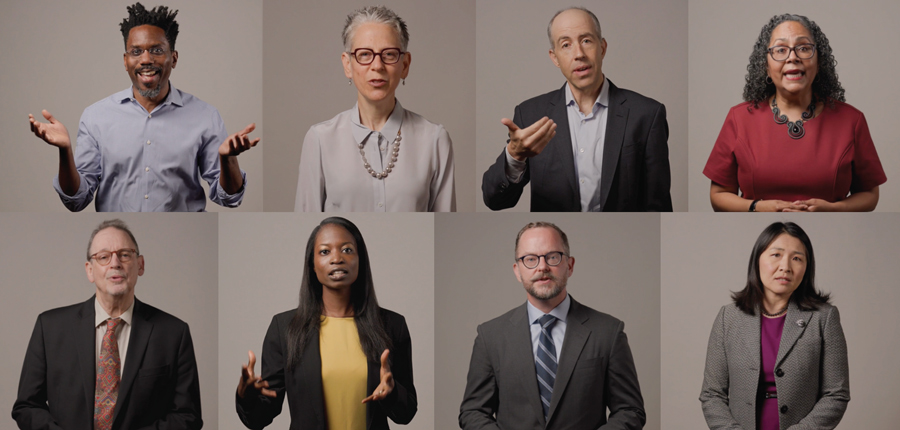Big Ideas



8 Fordham Law Professors Share the Ideas That Keep Them Up at Night—and Keep Them Passionate About the Possibilities of Legal Scholarship and Education
In a troubled world, making change requires thinking that is big, bold, and out of the box. That’s why we asked eight members of the Fordham Law faculty to share on video the big ideas that drive their work, how they can be used in our society today, and how legal scholarship can make a real impact. The topics are wide-ranging and include frontline workers’ rights; privacy and crime control; rethinking mutual fund voting; modernizing the constitution; the complexities of bias; the changing power dynamic between cities and states; the regulation of global trade and its relationship to migration; and combating inequalities in the nonprofit sector.
These conversations are important, because the law and legal scholarship play a critical role in helping all of us understand and address society’s most pressing issues, as well as identifying promising ways forward. To get in on the conversations, check out the topics on the next page.
Essential Workers’ Rights
Professor James Brudney, Joseph Crowley Chair in Labor and Employment Law, has dedicated most of his career and scholarship to workers’ rights. Before becoming a law professor, he served as chief counsel and staff director of the U.S. Senate Subcommittee on Labor. When the COVID-19 pandemic hit, Brudney pivoted, turning his focus to frontline workers. In his latest article, “Forsaken Heroes: COVID-19 and Frontline Essential Workers,” published in the Fordham Urban Law Journal, Professor Brudney lays out the inadequacy of these workers’ protections and proposes a legal framework to change the system.
Unmasking Latino Anti-Black Bias
Professor Tanya Hernández is the Archibald R. Murray Professor of Law at Fordham Law and an internationally recognized comparative race law expert. She specializes in the study of comparative race relations and antidiscrimination law, excavating the otherwise silenced voices of the Afro-Latino and African American victims of Latino anti-Blackness. Her work aims to aid those who care about the pursuit of racial equality by providing a more expansive view of the greater swath of the population that is harmed by anti-Black bias. In her upcoming book, Racial Innocence: Unmasking Latino Anti-Black Bias and the Struggle for Equality, Professor Hernández explores these ideas further.
Privacy, Equality, and Crime Control
A former federal prosecutor, Professor Bennett Capers serves as the director of the Center on Race, Law, and Justice at Fordham Law. His academic interests include the relationship between race, gender, technology, and criminal justice. Recently, Professor Capers has focused on how technology can help or hurt the drive for equality in the criminal justice system. In his article, “Afrofuturism, Critical Race Theory, and Policing in the Year 2044,” published in the New York University Law Review, he looks to the future of policing and criminal justice in a “majority-minority” country.
Globalization’s Impact on the Movement of People
Professor Jennifer Gordon focuses her scholarship on immigration and labor law, and the struggle for social justice. More specifically, Professor Gordon examines how globalization has opened up the world to a freer flow of goods, money, and services across borders, while the laws surrounding the movement of people and the rights of workers have become more restricted. In her scholarly work, she critiques this divide and asks what a fairer regime might look like. In her forthcoming article in Law & Social Inquiry, “In the Zone: Work at the Intersection of Trade and Migration,” Professor Gordon examines the global regulation of trade and its relationship with migration.
Reassessing How Cities and States Govern
Professor Nestor Davidson is the Albert A. Walsh Chair in Real Estate, Land Use, and Property Law and leads the Urban Law Center at Fordham Law. As a founding editor of SLoG Law Blog (State & Local Government Law Blog), he evaluates how cities and states govern using policies such as home rule. Professor Davidson argues that now more than ever, policies should empower cities to respond to crises in ways that best serve their communities. His latest article, “Do Local Governments Really Have Too Much Power? Understanding the National League of Cities’ Principles of Home Rule for the Twenty-First Century,” is forthcoming in the North Carolina Law Review.
Rethinking Mutual Fund Voting
Professor Sean J. Griffith is an expert in corporate and securities law and serves as the T.J. Maloney Chair in Business Law at Fordham Law. In his latest research, he posits answers to questions surrounding mutual fund voting, specifically when mutual funds should and should not vote on behalf of their investors. In “Opt-In Stewardship: Toward an Optimal Delegation of Mutual Fund Voting Authority,” in the Texas Law Review, Professor Griffith argues that voting authority depends on two things: information and purpose.
Combating Inequality in the Nonprofit Sector
Associate Professor Atinuke Adediran joined the Fordham Law faculty at the start of the 2021 academic year. She is an inter-disciplinary legal scholar with expertise in corporate social responsibility, nonprofit organizations, and the legal profession. Her scholarly articles, “Nonprofit Board Composition,” forthcoming in the Ohio State Law Journal, and “Disclosures for Equity,” forthcoming in the Columbia Law Review, spotlight the critical lack of awareness of inequality in the nonprofit sector, and how to use the law to address inequality in philanthropic funding.
Modernizing the Constitution
Professor Julie Suk focuses on women as constitution-makers at the intersection of law, history, sociology, and politics. Professor Suk’s interest in constitutional and social change has led her to explore the 21st-century revival of the Equal Rights Amendment (ERA) in her latest book, We the Women: The Unstoppable Mothers of the Equal Rights Amendment. We the Women maps out the past and future of the ERA and tells the stories of the forgotten female lawmakers and lawyers who shaped it over a century. Professor Suk’s scholarship calls for the modernization of the U.S. Constitution to make it more inclusive and responsive to 21st-century concerns.